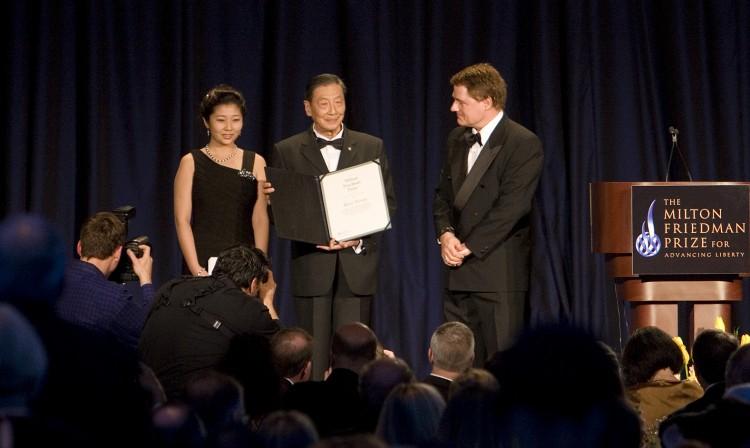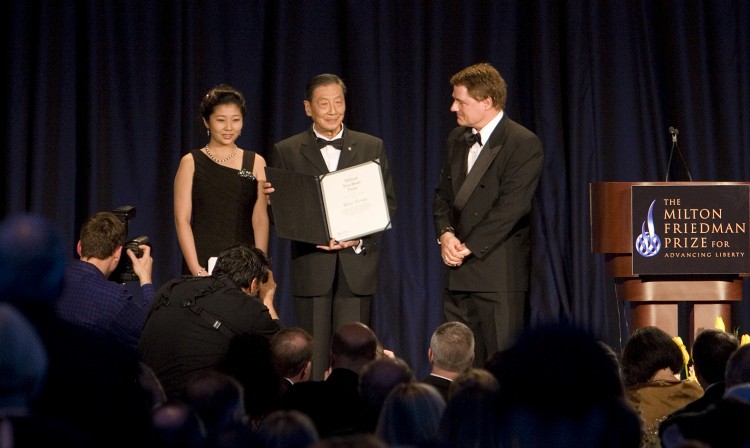WASHINGTON—A Chinese economist who has for decades fought for free market ideas in the communist state had his life’s work rewarded on the night of May 4, winning a prize from a libertarian think tank in the United States and $250,000 in cash.
Mao Yushi was branded a “rightist” by the Chinese regime in 1957, and was banished to the countryside for backbreaking labor where he ate locusts to survive.
He stands on one side of a critical struggle over ideological and political choices over China’s future. He argues for the path of political and economic reform, individual liberties, free speech, and ultimately an end to communist rule; on the other side is a future where the country’s resources continue to be exploited by a small political elite.
The Milton Friedman Prize for Advancing Liberty is presented by the Washington-based Cato Institute every two years to an individual who has contributed to free market ideas. It was given to Mao Yushi at a ceremony at the Washington Hilton. He plans to give the money away.
“He’s a teacher of virtue,” Tom G. Palmer, a senior fellow and director of Cato University, said of Mao. He characterized Mao as “one of the great patriots and real pioneers of China,” adding that he had been “persecuted, incarcerated, humiliated, publicly vilified, and threatened with death.”
In an unexpected twist, just before Mao was to be given the award the ceremony was disrupted by one such ideological foe, who charged the auditorium yelling in Chinese and holding placards accusing Mao of being a “running dog of the U.S.,” and “serving rich Americans,” recalling the Cultural Revolution-style smears Mao had endured in his youth.
Mao was born in 1929 and raised in an intellectual family. Originally trained as an engineer, he switched to the study of economics in the late 1970s, when China was going through its first reforms. He declined an invitation to rejoin the Communist Party instead becoming an advocate for individual liberty and free markets, establishing the Unirule Institute of Economics, an independent think tank, in Beijing in 1994.
In 2011, he wrote a blistering essay attacking the legacy of Mao Zedong—implicitly undermining the Communist Party, whose legitimacy is still based on an obfuscation of the true, cruel history of Mao Zedong. “In China, this farce still hasn’t come to a close,” he wrote, about the continued presence of Mao, for example, on banknotes.
Mao Yushi is in a delicate position with the authorities, but they tolerate him and he makes an attempt to be tolerable. The website of the Unirule Institute, which he still heads, was briefly shut down before he came to the United States, and there were questions about whether he would be allowed to travel. Scores of posts on Sina Weibo, China’s version of Twitter, about his winning the award were also deleted when it was announced in late March.
“I bring you my humble greetings from China,” Mao Yushi said on May 4. “I cannot express enough my grateful appreciation for the recognition and Cato’s many decades of invaluable support and guidance on the long road to liberty in China.”
Mao is acquainted with the often thin-skinned Communist Party cadres and censors. His most incendiary remarks of the evening were that “the rights of individuals do not come from the generosity of the state,” for which he received an ovation; and “The fruits of society are not the sole prerogative of the powerful and privileged few.” The reference was clear.
“There is a lot of animosity to the Party now,” said James A. Dorn, vice president for academic affairs at Cato, in an interview. “If they took an honest poll, they wouldn’t have much support.”
Dorn, who is also a China specialist, said that the critical reforms now facing China are the Communist Party divesting itself of state assets, lifting the system of financial repression, which systematically moves money from households to the state, and privatizing the banks.
“They don’t want to do it. They would lose political power if they don’t have control of the economy, because they would not have any favors to pass out. That’s how they retain their political power,” says Dorn.
Though in his writings Mao does not put too fine a point on the fact, by stridently calling for market reforms, an end to Party privileges, and true rule of law, Mao’s ideas if applied could undo the Party’s “leading role” in China.
“He wants to limit the power of government and that’s a challenge to the Communist Party, obviously,” said Dorn. “I imagine he has a lot of enemies in the CCP, but also friends. He’s careful, too—he’s not stupid.”
The Epoch Times publishes in 35 countries and in 19 languages. Subscribe to our e-newsletter.
Click www.ept.ms/ccp-crisis to read about the most recent developments in the ongoing power struggle within the Chinese communist regime. In this special topic, we provide readers with the necessary context to understand the situation. Get the RSS feed. Get the Timeline of Events. Who are the Major Players? ![]()







